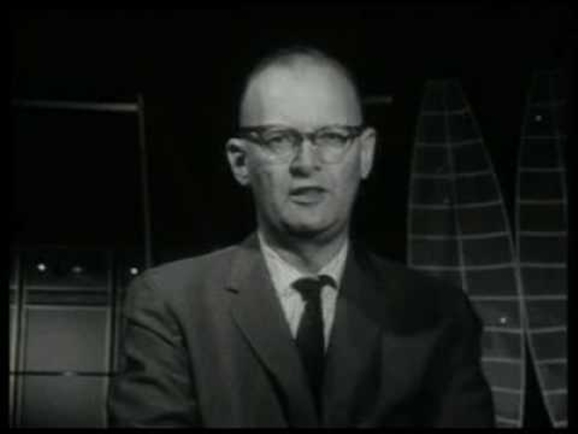Arthur C. Clarke Predicts The Future From 1964 — How Well Did He Do?
This article is more than 2 years old
 In addition to being one of the literary titans of the science fiction genre, Sir Arthur C. Clarke proved an adept hand at predicting the ways technology would evolve in the future, from game-changing communications satellites to visions of space flight that uncannily mirrored the eventual real thing. Of course, this sort of forecast runs the risk of you looking goofy a few decades down the line when we’re not all puttering around the sky in Jetsons vehicles. Or, as Clarke himself more eloquently put it:
In addition to being one of the literary titans of the science fiction genre, Sir Arthur C. Clarke proved an adept hand at predicting the ways technology would evolve in the future, from game-changing communications satellites to visions of space flight that uncannily mirrored the eventual real thing. Of course, this sort of forecast runs the risk of you looking goofy a few decades down the line when we’re not all puttering around the sky in Jetsons vehicles. Or, as Clarke himself more eloquently put it:
Trying to predict the future is a discouraging, hazardous occupation, because the prophet invariably falls between two schools. If his predictions sound at all reasonable, you can be quite sure that in 20, or at most 50 years, the progress of science and technology has made him seem ridiculously conservative. On the other hand, if by some miracle a prophet could describe the future exactly as it was going to take place, his predictions would sound so absurd, so far-fetched that everybody would laugh him to scorn.
Clarke made that declaration on a BBC science program called Horizon, first broadcast on September 21, 1964. Clarke’s appearance was on the sixth episode of the show (currently in its 50th year), an episode entitled “The Knowledge Explosion.” This was also around the time Clarke was working with director Stanley Kubrick to create a little independent film called 2001: A Space Odyssey, so Clarke’s mind was, if anything, even more focused on trying to prognosticate the future. Here are a couple of his predictions, which you can determine the validity of by looking around yourself and determining whether you’re in an underwater hotel or whatever.
Aiming for the year 2000, Clarke predicts a world where communications satellites allow us to be “in instant contact with each other, wherever we may be. Where we can contact our friends anywhere on Earth, even if we don’t know their actual, physical location.” This, Clarke said, would allow the citizens of the future to conduct business from wherever they may be, without being tied down to one particular office. And that’s pretty much 100% correct. He’s essentially predicting telecommuting, but our reality has taken it much farther than that. The Internet, cell phones, and social media have utterly reshaped our culture, and continue to do so in ever-surprising new ways. If those things didn’t exist, you wouldn’t be reading this, and there’s a really good chance you wouldn’t have access to the videos of Clarke that accompany this article. On this bullet point, Clarke knocked it out of the park.
However, he also predicts that these changes could be the death knell of cities as we know them, since no one will have to commute for any reason but pleasure. That obviously is not the case; not every job lends itself to telecommuting, and cities offer more reasons for clustering together than simply job convenience. They were and remain centers of culture, art, and business in such a way that they likely won’t be going extinct anytime soon.
Clarke predicts a form of bio-engineering that would involve “the development of intelligent and useful servants among the other animals on this planet, particularly the great apes and, in the oceans, the dolphins and whales.” Well, since I’m typing this myself rather than dictating it to my chimpanzee butler, I guess that’s a swing and a miss. While research continues to prove that creatures like apes and cetaceans are even more intelligent than we had given them credit for, we haven’t really gone down the particular path Clarke predicts. If anything, the role he’s describing looks to be filled more with robotics, if anything. But on the upside, we dodged that whole “super-chimpanzee trade union” problem.
Clarke predicted the rise of computers and artificial intelligence, and that they would eventually “completely out-think their makers.” Clarke didn’t see this as the looming threat people like Elon Musk do, instead saying, “I think we should see it as a privilege to be stepping stones to higher things.” That’s all well and good until a T-800 is mulching you and dumping your remains into a protein vat, Arthur.
What about the ability to write information directly on the brain, allowing us to become “instant experts?” Or erasing memories in the style of Eternal Sunshine of the Spotless Mind? We’re already doing it in mice.
Suspended animation, so that astronauts can sleep through the enormous distances space travel entails? Trials are already under way. Life extension? It seems the possibilities become more fascinating with each passing year.
Sadly, we don’t have colonies on the Moon or Mars, but both governmental and private space agencies have their eyes set on landing humans on the Red Planet within a few decades. As for terraforming other worlds to make them livable, that’s likely a lot further down the horizon, but then again getting to the Moon once seemed like an impossible task, until somebody did it.
You can watch the rest of Clarke’s Horizon appearance below.












